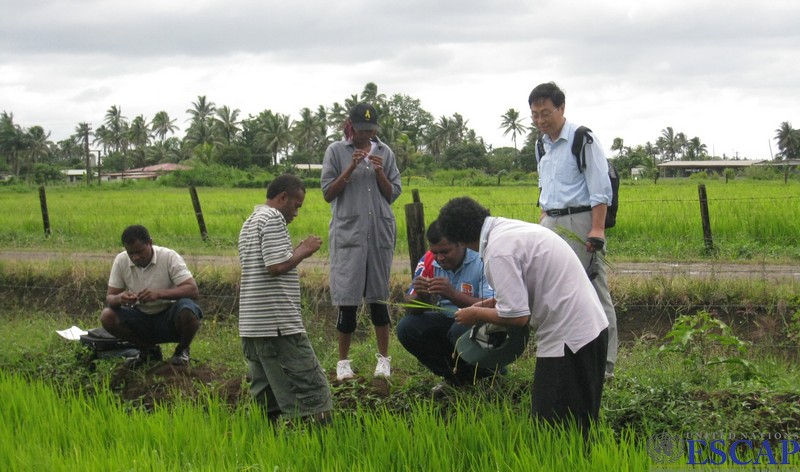UNAPCAEM Implements Tailored Training Programmes on Hybrid Rice Cultivation Technologies to Ensure Food Security in Member Countries
 UNAPCAEM, in collaboration with the Philippine Rice Research Institute, Centre for Appropriate Technology Development of the Ministry of Primary Industries of Fiji, and the Academy of Agricultural Sciences of Democratic People’s Republic of Korea, organized tailored training programmes on hybrid rice cultivation technologies from October through December 2010 in the three countries.
UNAPCAEM, in collaboration with the Philippine Rice Research Institute, Centre for Appropriate Technology Development of the Ministry of Primary Industries of Fiji, and the Academy of Agricultural Sciences of Democratic People’s Republic of Korea, organized tailored training programmes on hybrid rice cultivation technologies from October through December 2010 in the three countries.
The training was designed in response to member countries’ demand to upgrade their research and seed production capacity for rice production. Country-specific technology consultations put emphasis on how to adapt the hybrid rice cultivation skills to local conditions and address participating countries’ particular technology constraints in rice production. Experts were dispatched to participating countries to advise the local trainers and provide country-specific technological know-how. Intensive training on seed genetics, seed production and cultivation technology was held with wide participation from research institutes, extension service providers, policy makers, farmers and representatives from the private sector. Altogether nearly 70 participants took part in the training.
To ensure food security, the Philippine government has set up the National Hybrid Rice Research and Development Collaboration Program to conduct research on development of hybrid rice. Although great progress has been made in hybrid rice development in the Philippines, the country still needs technical assistance in seed production and consultation on private-public partnerships in hybrid rice technology promotion. On 17-31 October 2010, training was conducted in Los Banos, Davao, and Isabela in the Philippines with a focus on seed production. Experts also conducted on-site diagnosis of technical problems through visits to experimental rice fields and seed production facilities. Best practices and successful experiences were shared at a Public-Private Partnership Workshop.
From 5 November to 4 December 2010, a team of experts, working side by side with the Centre for Appropriate Technology Development of Fiji, organized a training of trainers workshop to introduce the breeding, seed production and cultivation techniques of hybrid rice in Dadav of Naitasini province in Fiji. Local researchers, technicians and extension workers joined the training. Fiji is still in the initial stage of hybrid rice technology research and development, and the Fiji government is paying considerable attention to increasing rice production. Under the support of FAO and other international organizations and through bilateral programmes, Fiji started hybrid rice project. Although progress has been made in increasing rice yield, Fiji still needs the advanced hybrid rice technology to improve its rice varieties and increase the rice yield, according to the country report.
From 11-18 December 2010, a week-long training was held at the Academy of Agricultural Sciences of DPR of Korea in Pyongyang. More than 20 researchers, technicians from rice research institutes, officials from different departments of the government, as well as rice farms participated in the training. With a focus on hybrid rice genetics and seed production, the training also provided the local researchers with technological know-how of developing high yielding rice varieties with strong resistance to diseases and insects.
Participating countries and local participants of the three countries spoke highly of the value of the tailored, country-specific technology consultations in upgrading their research capacity of high yielding rice production. They expressed strong interest in participating in follow-up programmes and carrying out further cooperation with UNAPCAEM to improve food security and promote sustainable agriculture in their respective countries.
This demand-driven technical assistance project is part of UNAPCAEM’s efforts in helping member countries increase grain production, with an ultimate goal of helping them achieve the MDGs by combating hunger and reducing poverty.
